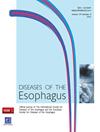639. WHICH FACTORS LEAD PATIENTS WITH BENIGN ESOPHAGEAL STRICTURES FOR SURGICAL TREATMENT BESIDES ENDOSCOPIC TREATMENT?
IF 2.3
3区 医学
Q3 GASTROENTEROLOGY & HEPATOLOGY
引用次数: 0
Abstract
Background This work proposes to evaluate patients with benign esophageal strictures, excluding caustic strictures, about their etiologies and poor prognostic factors for the success of endoscopic treatment. Methods It was evaluated in our service 38 patients, from 1992 to 2023, with benign esophageal strictures not related to caustic strictures. We could follow-up 24 patients from 7 months and 384 months (average of 136 months). Four died during the follow- up. We could analyze these following outcomes: clinical symptoms, surgical indications, age, gender, alcohol abuse, smoking, length of stricture, number of endoscopic dilation and stricture etiology. Results Concerning the 24 patients with follow-up, 4 had esophagectomy; 10 underwent endoscopic treatment with fundoplication and 10 were treated with endoscopic and medical treatment. Both groups, endoscopic and medical treatment, and endoscopic treatment with fundoplication had 4 patients that continued symptomatic (40%). The number of endoscopic dilations range from 1 to 101 (average 18) in each patient. The etiology of 38 patients with benign esophageal strictures were: 35 gastroesophageal reflux disease (13 Barrett´s esophagus); one with infectious esophagitis; one eosinophilic esophagitis and another due to esophageal varicose sclerosis. The prognostic factors to surgical treatment will be analyzed by statistical analysis. Conclusion From our data, it is possible to conclude that the endoscopic treatment is effective to manage the majority of benign esophageal strictures, even in association with fundoplication. Moreover, the main etiology was gastroesophageal reflux disease. Only few patients have developed indication to esophagectomy.639.除内镜治疗外,哪些因素会导致良性食管狭窄患者接受手术治疗?
背景 这项工作旨在评估良性食管狭窄(不包括腐蚀性狭窄)患者的病因和内镜治疗成功的不良预后因素。方法 我们对 1992 年至 2023 年期间患有良性食管狭窄(与腐蚀性狭窄无关)的 38 名患者进行了评估。我们对 24 名患者进行了 7 个月至 384 个月的随访(平均 136 个月)。其中 4 人在随访期间死亡。我们对以下结果进行了分析:临床症状、手术适应症、年龄、性别、酗酒、吸烟、狭窄长度、内窥镜扩张次数和狭窄病因。结果 在随访的 24 名患者中,4 人进行了食管切除术,10 人接受了胃底折叠术的内镜治疗,10 人接受了内镜和药物治疗。两组患者中,内镜和药物治疗组以及内镜治疗加胃底折叠术治疗组均有 4 名患者(40%)症状持续存在。每位患者的内镜下扩张次数从 1 次到 101 次不等(平均 18 次)。38 名良性食管狭窄患者的病因如下胃食管反流病 35 例(巴雷特食管 13 例);感染性食管炎 1 例;嗜酸性粒细胞食管炎 1 例;食管曲张硬化 1 例。手术治疗的预后因素将通过统计分析进行分析。结论 从我们的数据中可以得出结论,内镜治疗能有效控制大多数良性食管狭窄,即使与胃底折叠术同时进行也是如此。此外,主要病因是胃食管反流病。只有少数患者有食管切除术的适应症。
本文章由计算机程序翻译,如有差异,请以英文原文为准。
求助全文
约1分钟内获得全文
求助全文
来源期刊

Diseases of the Esophagus
医学-胃肠肝病学
CiteScore
5.30
自引率
7.70%
发文量
568
审稿时长
6 months
期刊介绍:
Diseases of the Esophagus covers all aspects of the esophagus - etiology, investigation and diagnosis, and both medical and surgical treatment.
 求助内容:
求助内容: 应助结果提醒方式:
应助结果提醒方式:


